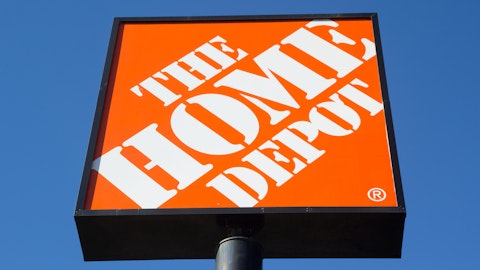The increase in home turnover and the home price appreciation, as well as the solid employment and wage growth, served as the main catalysts for growth in the U.S. home improvement industry throughout 2015. According to the Home Improvement Research Institute (HIRI), the home improvement product sales growth in 2016 is estimated to exceed the growth rate reached last year. The HIRI anticipates total home improvement product sales to grow 4.7% in 2016, with consumer market sales anticipated to increase 4.8% and the professional market sales estimated to climb 4.6%. Meanwhile, the sustained increase in U.S. home prices is expected to spur consumers’ willingness to invest in their homes, which implies the demand for home improvement product sales will most likely keep growing. According to fresh statistics, the value of the average U.S. home increased approximately 8% in the past year and 24% in the past five years. As the U.S. economy continues to grow, it may be a great idea for investors to turn their attention to the highly-concentrated U.S. home improvement industry. Thus, the following article will lay out a list of five home improvement retailers worth investors’ attention, which includes the two widely-known giants of the home improvement sector.
At Insider Monkey, we track around 785 hedge funds and institutional investors. Through extensive backtests, we have determined that imitating some of the stocks that these investors are collectively bullish on can help retail investors generate double digits of alpha per year. The key is to focus on the small-cap picks of these funds, which are usually less followed by the broader market and allow for larger price inefficiencies (see more details about our small-cap strategy).
#5 Beacon Roofing Supply Inc. (NASDAQ:BECN)
– Investors with Long Positions (as of December 31): 24
– Aggregate Value of Investors’ Holdings (as of December 31): $296.94 Million
There were 24 hedge funds from our database with stakes in Beacon Roofing Supply Inc. (NASDAQ:BECN) at the end of the December quarter, as compared to 22 funds a quarter earlier. Similarly, the overall value of those stakes grew to $296.94 million from $210.05 million quarter-on-quarter, with the 24 funds amassing 12.20% of the company’s outstanding common stock heading into 2016. Beacon Roofing Supply is the second-largest distributor of residential and non-residential roofing materials on the North American continent. In October 2015, the company completed the acquisition of roofing products distributor Roofing Supply Group in a cash-and-stock deal valued at roughly $1.2 billion. RSG was distributing roofing supplies and other related materials from 85 locations across 25 states prior to the merger completion, so the deal is set to strengthen Bacon’s position in the U.S. roofing materials industry. In early February, the company reported its financial results for the first quarter of fiscal 2016 that ended December 31, posting total sales of $976.5 million. The company’s first-quarter top-line figure increased by 63.8% year-on-year, mainly due to the aforementioned acquisition and other freshly-completed acquisitions. Even so, Beacon’s first-quarter organic growth in existing markets reached a rate of 11.8%. Shares of Bacon are up 29% in the past 12 months, but are down 2% year-to-date. Mariko Gordon’s Daruma Asset Management owns 1.63 million shares of Beacon Roofing Supply Inc. (NASDAQ:BECN) as of the end of the December quarter.
Follow Qxo Building Products Inc. (NASDAQ:BECN)
Follow Qxo Building Products Inc. (NASDAQ:BECN)
Receive real-time insider trading and news alerts
#4 Builders FirstSource Inc. (NASDAQ:BLDR)
– Investors with Long Positions (as of December 31): 30
– Aggregate Value of Investors’ Holdings (as of December 31): $254.74 Million
Builders FirstSource Inc. (NASDAQ:BLDR) lost its appeal among the investors monitored by Insider Monkey during the October-December period, as the number of funds invested in the company dropped to 30 from 39 quarter-over-quarter. Nonetheless, the value of funds’ positions in the company increased to $254.74 million from $231.62 million during the same period and represented 21% of Builders FirstSource’s outstanding stock on December 31. The company operates as a supplier and manufacturer of building materials, manufactured components and construction services primarily in the professional segment of the U.S. residential building products supply market, mainly serving professional customers such as homebuilders and remodeling contractors. The Pro Segment of the residential building products supply market is highly fragmented, so Builders FirstSource mostly faces competition from privately-held local businesses. Therefore, the company does have a strong competitive edge over smaller competitors given its customer relationships, local market knowledge and competitive pricing. The company’s 2015 net sales reached $3.56 billion, which marked an increase of 122.2% year-on-year. The increase was mainly driven by recent acquisitions, which added $1.91 billion to the 2015 top-line figure. Excluding the impact of acquisitions, net sales increased 3.1% year-on-year due to an 8.5% increase in volume, partly offset by a 5.4% impact of commodity price deflation. Shares of Builders FirstSourse have declined 7% since the beginning of 2016 despite having gained nearly 30% in the past month alone. Israel Englander’s Millennium Management reported owning 1.81 million shares of Builders FirstSource Inc. (NASDAQ:BLDR) in its 13F filing for the final quarter of 2015.
Follow Builders Firstsource Inc. (NYSE:BLDR)
Follow Builders Firstsource Inc. (NYSE:BLDR)
Receive real-time insider trading and news alerts
#3 Sherwin-Williams Co (NYSE:SHW)
– Investors with Long Positions (as of December 31): 43
– Aggregate Value of Investors’ Holdings (as of December 31): $1.91 Billion
The number of hedge funds with long positions in Sherwin-Williams Co (NYSE:SHW) declined to 43 from 45 during the last three months of 2015, whereas the total value of those positions grew to $1.91 billion from $1.61 billion quarter-on-quarter. Just recently, Sherwin-Williams, which engages in the manufacturing and sale of paint, coatings and related products, announced an agreement to purchase paint maker The Valspar Corp (NYSE:VAL) for approximately $11.3 billion. Under the terms of the freshly-inked deal, Valspar shareholders are set to receive $113 per share in cash. The combined company has 2015 pro-forma annual revenue of approximately $15.6 billion, outpacing industry rivals such as PPG Industries Inc. (NYSE:PPG) and Akzo Nobel N.V. (ADR) (OTCMKTS:AKZOY), which had 2015 sales of $15.3 billion and $13 billion, respectively. The multi-billion-dollar deal is anticipated to drive $280 million of annual synergies in the areas of sourcing, SG&A, process and efficiency savings within two years, while the long-term annual cost synergy aim is $320 million. Analysts at Credit Suisse recently initiated coverage on Sherwin-Williams with an ‘Outperform’ rating and a price target of $308. According to Credit Suisse analysts, there is a 95% probability that the aforementioned combination will close successfully, an 80% probability that the deal will go through without any divestitures and a 15% probability that the deal will go through with some divestitures. Shares of Sherwin-Williams are 9% in the green year-to-date. Jim Simons’ Renaissance Technologies had 303,900 shares of Sherwin-Williams Co (NYSE:SHW) in its portfolio at the end of December 2015.
Follow Sherwin Williams Co (NYSE:SHW)
Follow Sherwin Williams Co (NYSE:SHW)
Receive real-time insider trading and news alerts
#2 Home Depot Inc. (NYSE:HD)
– Investors with Long Positions (as of December 31): 62
– Aggregate Value of Investors’ Holdings (as of December 31): $3.72 Billion
The hedge fund sentiment towards Home Depot Inc. (NYSE:HD) declined in the fourth quarter of 2015, with the number of funds invested in the company dropping to 62 from 69. The value of funds’ equity investments in the company shrank to $3.72 billion from $3.94 billion quarter-on-quarter. Home Depot is the largest home improvement retailer in the world, operating 2,274 The Home Depot stores as of the end of January across the United States, including the Commonwealth of Puerto Rico and the territories of the U.S. Virgin Islands and Guam, Canada and Mexico. The company’s net sales for fiscal 2015 that ended January 31 totaled $88.52 billion, which increased 6.4% year-on-year. Home Depot’s fiscal 2015 total comparable store sales grew 5.6% year-over-year due to a 4.0% increase in comparable store customer transactions and a 1.6% increase in comparable store average ticket. More importantly, the company’s comparable store sales for U.S. stores increased 7.1% year-on-year. Home Depot’s fiscal 2015 diluted earnings per share totaled $5.46, up from $4.71 reported for fiscal 2014. The shares of Home Depot have advanced 14% in the past 52 weeks and trade around 18.6-times expected earnings, versus the forward P/E multiple of 19.8 for the Home Improvement Retailers sector. The company also pays out an annualized dividend of $2.76 per share, which equates to a dividend yield of 2.12%. Ken Fisher’s Fisher Asset Management is the largest equity holder of Home Depot Inc. (NYSE:HD) within our database, holding 8.47 million shares as of the end 2015.
Follow Home Depot Inc. (NYSE:HD)
Follow Home Depot Inc. (NYSE:HD)
Receive real-time insider trading and news alerts
#1 Lowe’s Companies Inc. (NYSE:LOW)
– Investors with Long Positions (as of December 31): 66
– Aggregate Value of Investors’ Holdings (as of December 31): $3.91 Billion
Lowe’s Companies Inc. (NYSE:LOW) dethroned Home Depot as the most-favored home improvement retailer in the hedge fund industry at the end of 2015. The smart money sentiment towards Lowe’s Companies increased dramatically during the December quarter, as the number of money managers with stakes in the company climbed to 66 from 56 quarter-on-quarter. Similarly, the aggregate value of those stakes increased to $3.91 billion from $3.35 billion quarter-over-quarter. Lowe’s Companies operates 1,857 home improvement and hardware stores in the United States, Canada and Mexico as of January 29. The company’s fiscal 2015 sales were $59.07 billion, which increased 5.1% year-on-year. Meanwhile, comparable sales for the U.S. home improvement business grew 5.1% year-over-year. Adjusted net earnings for fiscal 2015 were $3.08 billion, which increased 14.0% as compared to fiscal 2014. Similarly, adjusted diluted earnings per share grew 21.4% year-on-year to $3.29. More importantly, the management of Lowe’s Companies anticipates fiscal 2016 total sales to grow roughly 6%, while comparable sales are anticipated to grow 4%. The management anticipates diluted earnings per share of $4.00 for fiscal 2016 that ends February 3, 2017. The stock is priced at 16.1-times expected earnings, significantly below the forward P/E ratio for its main competitor, Home Depot, as well as the ratio for the entire industry. Ken Griffin’s Citadel Advisors LLC holds a 5.54 million-share position in Lowe’s Companies Inc. (NYSE:LOW) as of the end of December 2015.
Follow Lowes Companies Inc (NYSE:LOW)
Follow Lowes Companies Inc (NYSE:LOW)
Receive real-time insider trading and news alerts
Disclosure: None





